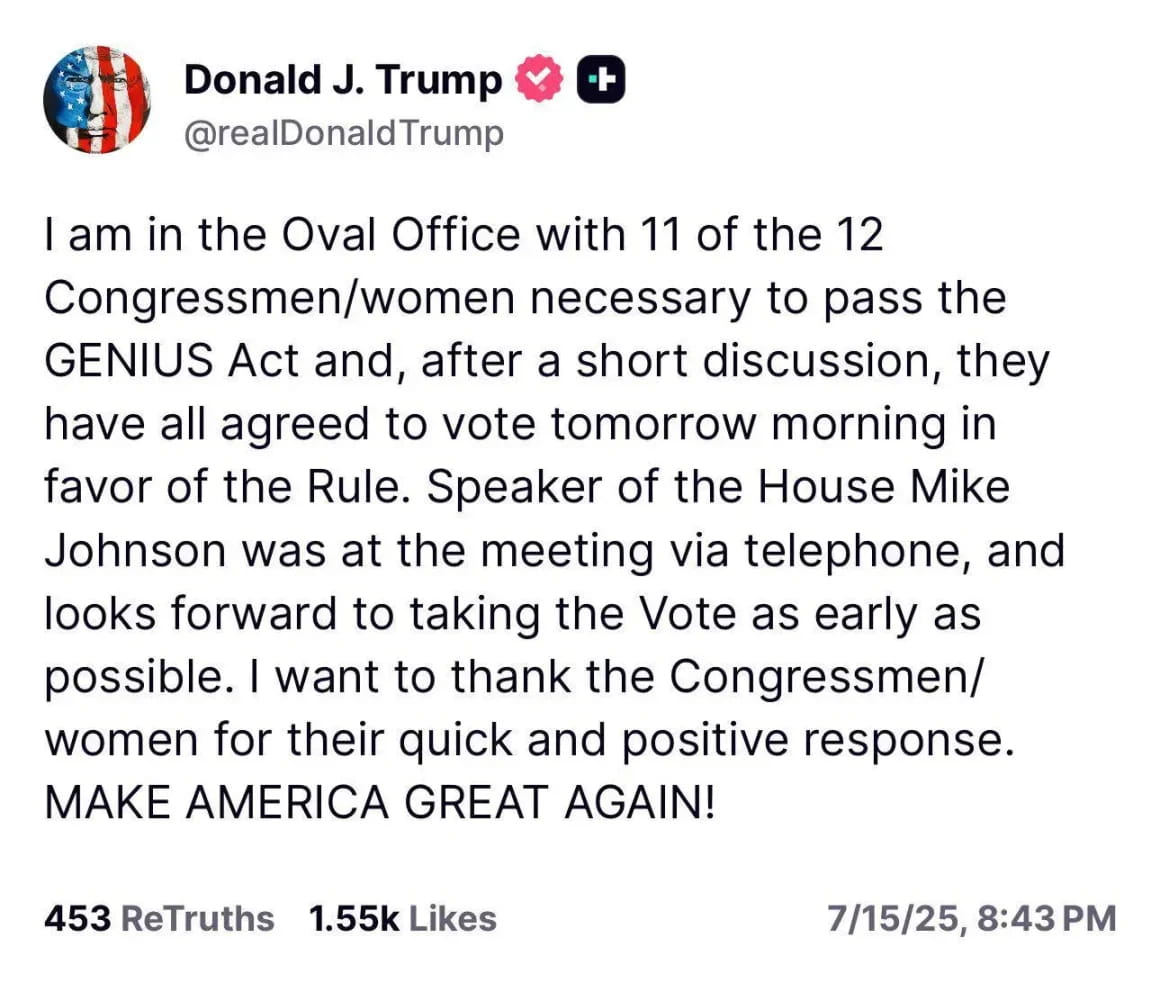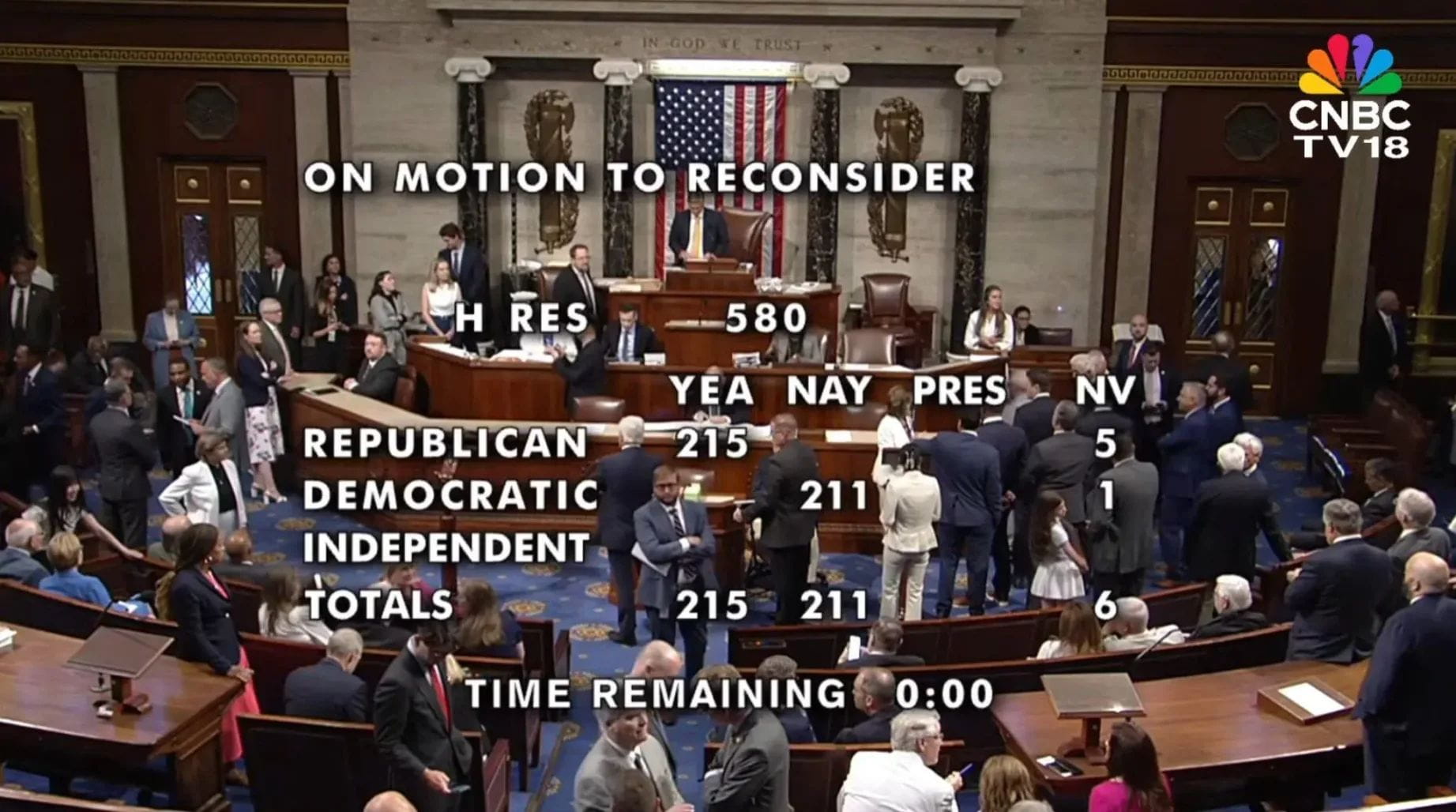Written by: Weilin, PANews
On July 17 (Wednesday local time), the U.S. House of Representatives passed a procedural vote on three major cryptocurrency bills, paving the way for votes on the GENIUS Act, Clarity Act, and anti-CBDC bill, which are expected to be voted on again on Thursday local time.
Although July 14 was previewed as the House 'Crypto Week', the actual voting process was fraught with ups and downs. On Tuesday afternoon local time, the House voted 196 to 223 to block the advancement of three proposals, with 12 Republicans opposing and expressing concerns about the ambiguity of the GENIUS Act regarding CBDCs.
9-hour voting sets a record! 3 bills finally advanced, the Genius Act progresses the fastest
The latest vote on July 17 (Wednesday local time) lasted over 9 hours, setting a record for the procedural voting duration in the House. Ultimately, around 11 PM, House Resolution No. 580 was passed for the consideration of several bills, with a voting result of 217 votes in favor and 212 votes against. Just a day earlier, this bill unexpectedly failed to pass the House's procedural vote.
When House Majority Leader Steve Scalise announced that the Republicans would attach the CBDC ban to the National Defense Authorization Act (NDAA), the previous issues were resolved, ensuring that the CBDC ban would pass along with the must-pass NDAA, prompting the eight conservative Republicans who blocked the bill on Tuesday to ultimately change their voting stance.
According to PunchBowl News, after the successful vote, House Majority Leader Steve Scalise stated that the next round of House votes on these cryptocurrency bills would take place on Thursday.
Currently, among the three crypto-related bills, the GENIUS Act is considered to be progressing the fastest. This bill aims to establish a regulatory framework for stablecoins and passed a Senate vote last month. The GENIUS Act could be sent to President Trump for signing before the end of this week.
The other two proposals include the Digital Asset Market Clarity Act (Clarity Act), which takes a more comprehensive approach to creating a regulatory framework for digital assets, clarifying the regulatory roles of the Securities and Exchange Commission (SEC) and the Commodity Futures Trading Commission (CFTC).
Legislators also voted to consider the anti-CBDC bill, aimed at preventing the Federal Reserve from directly issuing central bank digital currency to individuals. Even if the Clarity Act and anti-CBDC bill pass the House vote, they still need to be voted on in the Senate.
President Trump personally meets with lawmakers and calls to urge the advancement of the legislative process
According to Politico, a breakthrough occurred at the last moment in Wednesday's deadlock when President Trump called House Speaker Mike Johnson's office and expressed satisfaction with the agreement reached.
As early as the morning of July 15 local time, Trump stated on the social media platform Truth Social, 'Happy Crypto Week! The House will soon vote on a major bill aimed at making the U.S. the undisputed global leader in digital assets,' urging House members to pass the procedural vote.
However, on Tuesday, the House voted 196 to 223 to block the advancement of the rule proposal, with 12 Republicans opposing and expressing concerns about the ambiguity of the GENIUS Act regarding CBDCs. But in reality, some provisions in the GENIUS Act explicitly prohibit the Federal Reserve from creating CBDCs.
After the vote failed, on the evening of July 15, Trump quickly summoned the opposing lawmakers to the White House and announced he had persuaded them all to support the measure. On July 16, President Trump posted that he met with 11 House members in the Oval Office on July 15 to discuss the legislative rules for the 'GENIUS Act', and unanimous consent was obtained to support the rule the following morning.

By Wednesday, the initial vote ended dramatically with 215 votes in favor and 211 votes against. The voting results were revealed at the last moment, with a small number of Republicans opposing the rule until intense exchanges with party leadership on the House floor prompted them to change their votes to 'yes' at the last moment.
However, these staunchly opposed Republicans later withdrew their support during the second 'record vote', leaving the House floor to negotiate with party leadership on potential agreements to advance legislation, conditional on a clearer revision of the wording regarding the CBDC ban.

Republican hardliners blocking the procedural vote pushed to combine the market structure bill (Clarity Act) with a partisan piece of legislation banning central bank digital currency. Republican Congressman French Hill and Pennsylvania Republican Congressman G.T. Thompson, chairs of the Republican Financial Services Committee and Agriculture Committee, opposed this plan, fearing it would weaken Democratic support for the market structure bill.
After Republican leaders indicated they would attach a ban on CBDCs (which conservatives believe the government-issued digital dollar would open the door to privacy violations) to a must-pass defense authorization bill, Republican rebels dropped their opposition. This agreement was reached after a late-night meeting at House Speaker Mike Johnson's office.
According to two anonymous attendees, Trump called in at the last moment and was briefly briefed on the agreement's content. 'He was very pleased with it,' one of the attendees said.
At 4 AM on July 17, according to two informed sources, the U.S. Senate Banking Committee is delaying the release of the market structure discussion draft originally scheduled for the next day. Their thinking is to wait and observe the movements of the House and reconsider introducing the bill once the situation becomes more 'clear'.
According to Politico, the vote on the Clarity Act may be postponed until next week.
It is expected that the GENIUS Act will be sent to President Trump for signing within this week and become the first significant cryptocurrency bill passed by Congress, marking a major lobbying victory for crypto companies.
Overall, the House 'Crypto Week' has profound implications for the digital asset space. These bills could not only reshape the landscape of the U.S. crypto industry but also set important foundational precedents for future digital asset regulation. With the progress of the bills and the intervention of President Trump, will the regulatory framework continue to advance smoothly? Can the U.S. government fulfill its promise to be the 'crypto capital'?
